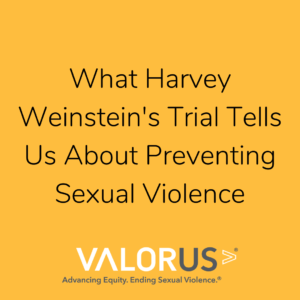Note: This Blog Post was originally published in November and has been edited to reflect the trial verdict issued in December.
As our nation, and millions of survivors, react to the verdict in Harvey Weinstein’s trial in Los Angeles this week, we look again to our future and the work we have ahead to reach a world free of sexual violence. 
It has been five years since #MeToo went viral and hundreds of powerful people, predominantly men, were forced to face accountability for their abuse. Of those hundreds, only seven have been convicted and another five face charges. We know that the criminal justice system is not built to hold abusers accountable. We have been reminded of that reality each time a powerful abuser is let off with a light sentence or no sentence at all.
It has been two years since Weinstein was convicted of rape and criminal sexual assault, a trial that was largely seen as symbolic in the #MeToo movement, after details of his abuse catapulted the anti-violence movement into the national spotlight.
Weinstein was one of the very few who were convicted for their abuse, a seeming win for the anti-violence movement. But these past few weeks, as Weinstein’s lawyers used sexist insults to belittle survivors who shared their stories, we are met with two realities in this country:
- Many people, not excluding those in power, do not believe survivors.
- The prevalence of sexual assault is not going down. In fact, a larger national spotlight has revealed the persistence and pervasiveness of the problem.
In fact, the Center on Gender Equity and Health’s recent CalVEX study on Californian’s experience from sexual violence highlights an increase in reports of violence between 2020 and 2022 for both men and women, a reality many states across the U.S. are also grappling with.
What we are doing isn’t working. Our reliance on the criminal justice system will never end sexual violence because it fails to address why people cause harm in the first place. Black and brown women have been telling us that investing in carceral systems will only continue systems of harm since they started this movement decades ago. Carceral systems focus on prosecuting abusive individuals while failing to address why people abuse in the first place.
When more than 1.5 million Californian’s report committing some form of sexual harassment or violence, we know that sexual violence is systemic, it is deeply embedded into the systems in which we live our lives and raise our children.
The good news about systems is that they have to be built, so they can be dismantled.
When all we do is respond to a problem, we never open our minds to a world where the problem doesn’t exist. Harvey Weinstein, the abusers who came before him, as well as all who will come after, are a reminder that we must invest in prevention. While responding to sexual violence and providing a path to healing are important pieces to our work, they cannot exist alone.
At VALOR, we are committed to not only providing pathways to healing for survivors, but to preventing and ending sexual violence by advancing equity and eradicating oppression. That means we must dig deep, look within ourselves and our communities, and address the systems in which violence thrives: systems like racism, sexism, heterosexism and ableism. We must hold our friends, colleagues and neighbors accountable not only when they commit harm, but when they uphold traditions and norms that enable it.
We are proud to stand alongside the brave survivors who came forward in the Weinstein trial and so many others, the survivors who speak up knowing the system is stacked against them and the survivors who silently carry the weight of what happened to them.
We all know someone who has survived sexual or domestic violence. It is widespread and reaches into all of our lives, whether we are aware of it or not. And just as we all know someone impacted by violence, we all have a role to play in preventing it. We must prevent violence. We have a long road ahead and the work is not over.

